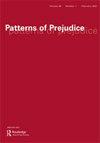“种族和国家的繁殖者”:战后英国法西斯话语中的性别、性和繁殖力
IF 0.8
2区 社会学
Q4 ETHNIC STUDIES
引用次数: 0
摘要
伯内特和理查森的论文有两个相关的目的。首先,在回顾相关学术研究的基础上,本文建立了一个关于性别如何在法西斯主义和其他极右翼话语中表达的模型。该模型将在第一部分中介绍。研究人员过去曾指出,在对极右翼的研究中,性别问题存在空白,甚至是故意忽视,并声称这个话题被“忽视”和“研究不足”。在某种程度上,这种差距是由学科、历史和定义的界限所开放的,这些界限支离破碎地分裂了探究。因此,伯内特和理查森以一种万花筒式的方式阅读了这些文献,包括对不同历史时期和国家背景的分析,以研究性别如何在各种“法西斯”话语中出现。这种方法涵盖了对性别和法西斯主义的精神分析、话语分析、历史、艺术史、文学、政治和人类学方法。本文的第二个目的是展示所提出的模式如何在一个特定的国家背景下发挥作用:第二次世界大战以来的联合王国。战后英国法西斯主义中的性别一直是几项重要研究的主题,尽管没有一项研究专门追踪了与中介极右翼话语中性别相关的关键思想和主题的文本历程。基于对这一时期法西斯政治发展的话语历史分析方法,伯内特和理查森认为,关注法西斯话语中的性别是一个有用的视角,通过它可以分析使一种法西斯话语形成不同于另一种的地方和历史偶然事件。本文章由计算机程序翻译,如有差异,请以英文原文为准。
‘Breeders for race and nation’: gender, sexuality and fecundity in post-war British fascist discourse
ABSTRACT Burnett and Richardson’s paper has two related aims. First, it develops a model of how gender is articulated within fascist and other far-right discourses based on a review of the relevant scholarship. This model is presented in the first section. Researchers have in the past suggested a gap, or even a wilful ignorance, of gender in studies of the far right, and claimed that the topic is ‘neglected’ and ‘under-researched’. This gap is to some extent held open by disciplinary, historical and definitional boundaries that work fractally to split inquiry. Burnett and Richardson have thus read the literature in a kaleidoscopic fashion, including analysis across different historical periods and country contexts, to examine how gender surfaces in various ‘fascist’ discourses. This approach covered psychoanalytical, discourse analytical, historical, art historical, literary, political and anthropological approaches to gender and fascism. The second aim of the paper is to show how the model proposed is brought into relief in a particular country context: that of the United Kingdom since the Second World War. Gender in post-war British fascism has been the subject of several important studies, though none of them have specifically traced the textual journey of key ideas and themes related to gender in mediatized far-right discourse. Building on a discourse-historical analytic approach to the development of fascist politics of this period, Burnett and Richardson argue that paying attention to gender in fascist discourse is a useful lens through which to analyse the local and historical contingencies that make one fascist discursive formation differ from another.
求助全文
通过发布文献求助,成功后即可免费获取论文全文。
去求助
来源期刊

Patterns of Prejudice
Multiple-
CiteScore
2.50
自引率
0.00%
发文量
11
期刊介绍:
Patterns of Prejudice provides a forum for exploring the historical roots and contemporary varieties of social exclusion and the demonization or stigmatisation of the Other. It probes the language and construction of "race", nation, colour, and ethnicity, as well as the linkages between these categories. It encourages discussion of issues at the top of the public policy agenda, such as asylum, immigration, hate crimes and citizenship. As none of these issues are confined to any one region, Patterns of Prejudice maintains a global optic, at the same time as scrutinizing intensely the history and development of intolerance and chauvinism in the United States and Europe, both East and West.
 求助内容:
求助内容: 应助结果提醒方式:
应助结果提醒方式:


